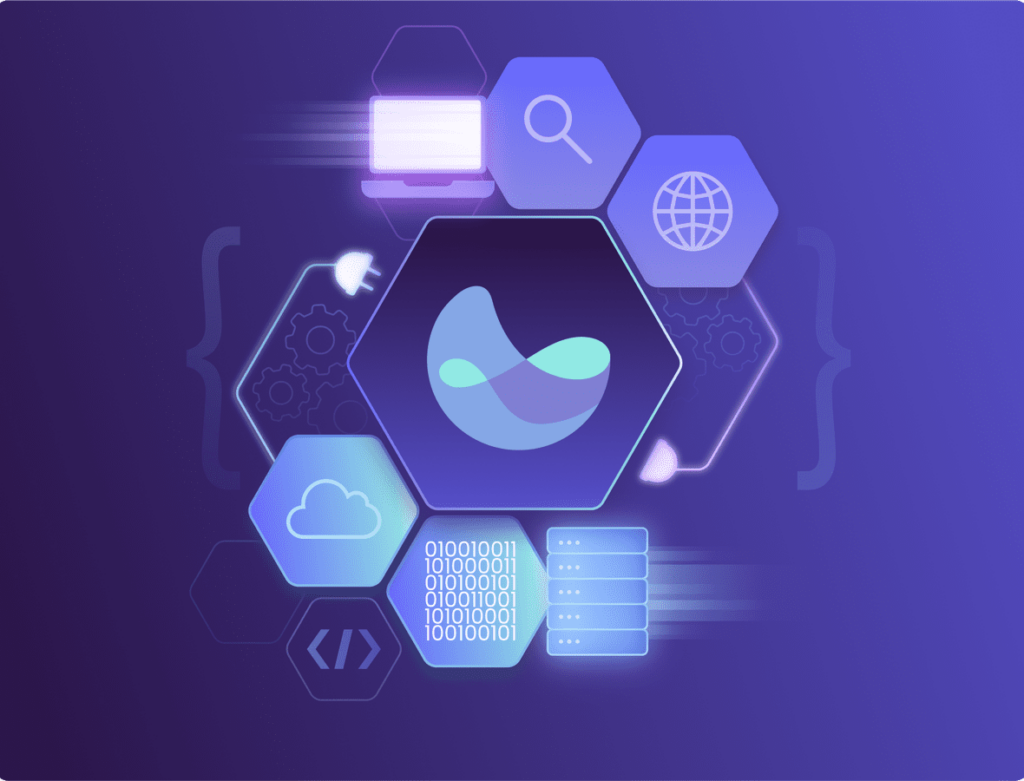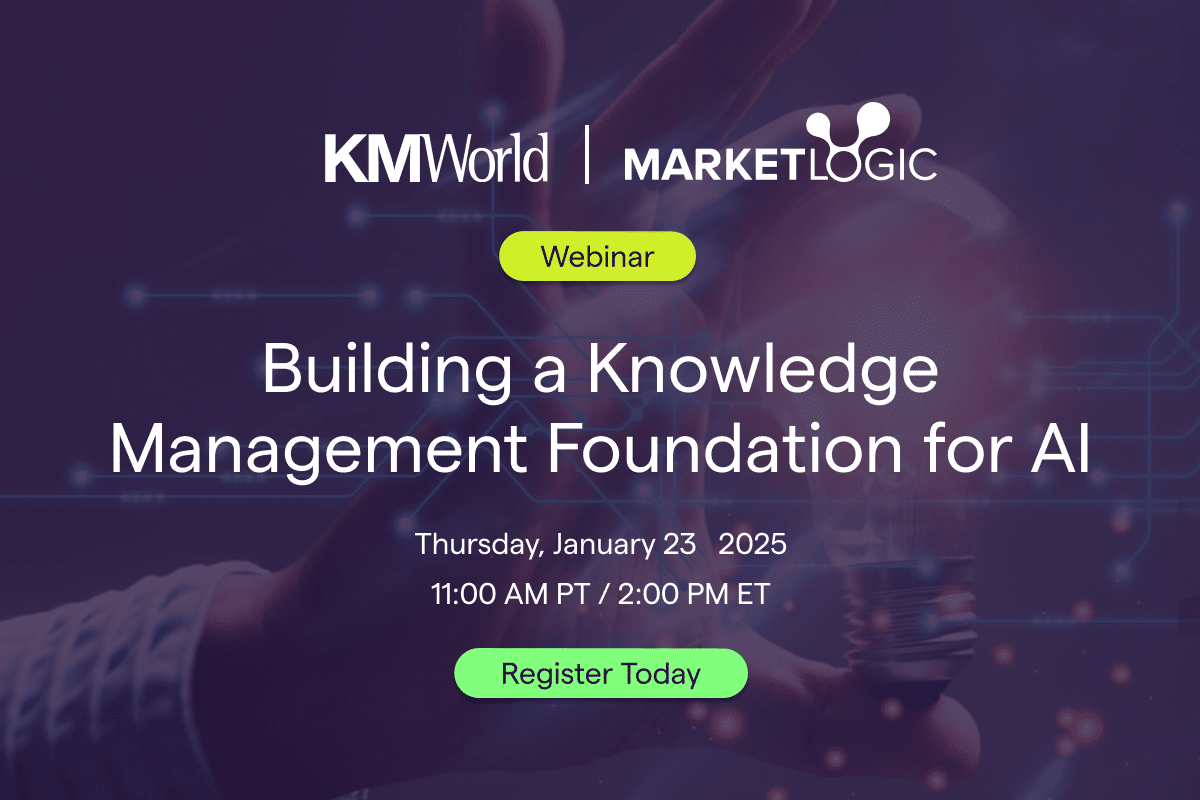The landscape of knowledge management trends is undergoing a remarkable transformation, driven by technological advancements and the growing recognition that knowledge is an organization’s most valuable asset. Artificial intelligence (AI) and machine learning (ML) are revolutionizing how organizations like yours capture, share, and leverage their collective intelligence. These emerging technologies aren’t just enhancing existing knowledge management practices — they’re fundamentally reshaping how organizations approach knowledge sharing and decision-making.
For organizational leaders, marketing management, and other high-level decision-makers, understanding these knowledge management trends and aligning with them is crucial to remaining competitive in an increasingly complex business environment. That’s why we’re uncovering seven major transformative trends that are set to define the future of knowledge management, with a focus on how AI-driven innovations are addressing customer concerns while boosting operational efficiency and team productivity.
1. Hyper-personalized knowledge experiences will transform learning and development

The evolution of knowledge management systems is moving decisively toward personalization, powered by sophisticated AI algorithms that understand and adapt to individual user needs. This shift represents one of the most significant knowledge management trends, as organizations are increasingly recognizing the value of delivering tailored knowledge experiences to their workforce.
These advanced technologies analyze various factors, including role requirements, past interactions, and learning patterns, to create personalized knowledge pathways for each user.
The essential features of hyper-personalized knowledge include:
- Role-based recommendations: Smart algorithms work to analyze employee roles, responsibilities, and skill levels to deliver highly relevant content and learning resources, ensuring maximum value from every interaction.
- Personalized learning paths: AI-driven systems can curate customized learning journeys for each employee, ensuring they acquire the necessary knowledge and skills to excel in their roles while supporting career development.
Real-time insights: Intelligent systems can also provide employees with immediate access to relevant information and insights, empowering them to make informed decisions quickly and effectively in their daily work.
2. Advanced AI-driven automation will streamline information management
Another important trend that will vastly contribute to the future of knowledge management is AI-driven automation. Organizations of all sizes increasingly face the challenge of managing information overload while ensuring both information and content quality. AI-driven automation will revolutionize how organizations capture, curate, and manage their knowledge assets.
Large language models (LLMs) and generative AI are taking center stage in this automation transformation, by automatically extracting valuable information from various sources – including virtual meetings, email threads, and collaboration tools. This technological advancement is particularly crucial for professional services firms and organizations dealing with vast amounts of critical knowledge.
AI automation will streamline information capturing and management via these key capabilities:
- Automated knowledge extraction: Sophisticated AI algorithms automatically extract key information from diverse sources. This includes everything from website and consumer data to unstructured data like meeting transcripts and social media conversations, and in some cases, visual data like graphs and charts, transforming raw data into actionable insights.
- Intelligent content organization: Advanced classification systems automatically categorize and tag content based on context and relevance, ensuring information is easily searchable and accessible to the right people at the right time.
- Continuous knowledge refinement: AI-powered systems continuously monitor and refine the knowledge base by identifying and correcting errors, ensuring information remains accurate and up-to-date while reducing manual maintenance efforts — and, giving you greater confidence in your decision-making. Some AI assistants are capable of identifying inconsistencies like limitations and contradictions in your knowledge assets. For instance, it can flag data gaps within the sources — pinpointing areas that require further investigation, to ensure a more complete understanding of the topic.
3. Intelligent knowledge assistants will become indispensable workplace partners
The rise of generative AI-powered virtual assistants represents a key driver in the evolution of knowledge management practices. These intelligent tools are becoming increasingly sophisticated, offering contextual support and guidance that extends far beyond simple query-response interactions.
The integration of these AI-powered assistants into daily workflows can provide several critical advantages moving forward, including:
- Instant access to information: Natural language processing (NLP) enables users to ask questions in their own words and receive instant, contextually relevant answers from vast repositories of organizational knowledge. When it comes to AI-powered search and NLP capabilities, DeepSights™ by Market Logic excels in allowing users to not only use natural language to search and access information but it automatically retrieves that information from the most current global sources to bring you the best possible answers.
- Data extraction: Intelligent assistants can automatically identify, extract, and structure relevant information from various document formats and sources, making previously unstructured data accessible and actionable for business insights. DeepSights™ also features automatic aggregation and extraction of key information from various sources including reports, presentations, news articles, licensed content, and more to deliver a holistic market overview. By incorporating Gemini for Google Cloud’s visual extraction capabilities that read data in graphs and charts, the AI-powered assistant empowers users to make decisions grounded in comprehensive, nuanced insights.

- Proactive guidance: AI-powered assistants anticipate user needs and provide personalized recommendations on best practices, significantly improving efficiency and reducing errors in complex tasks. DeepSights™ machine-learning capabilities also allow for the analysis of user behavior and past queries to anticipate future needs and offer relevant suggestions and alerts for greater data personalization.
- 24/7 availability: Round-the-clock access to knowledge and support from any device ensures consistent information availability across time zones and work schedules, supporting global operations. As a cloud-based platform, DeepSights™ is accessible night and day from any device with an internet connection, ensuring continuous access to information and insights and the support of global teams who require on-demand access.
- API integration: These assistants can seamlessly connect with existing enterprise systems and third-party applications through robust APIs, enabling automated workflows and enhanced functionality across the organization’s tech stack. With DeepSights™, organizations like yours can reap the benefits of seamless integration with other business management systems to unify and improve workflows through features like alerts based on specific market events, automatic CRM updates with newer, competitive intelligence, and the integration of market insights into everyday business planning tools.
4. Risk-aware knowledge management will safeguard intellectual capital
As organizations continue their digital transformation journeys, the protection of knowledge assets has become paramount. When it comes to modern knowledge management trends and how they’ll shape the future, there’s a clear shift toward AI-powered risk management systems that safeguard an organization’s intellectual capital while supporting organizational objectives.
These systems will continue to provide comprehensive protection through:
- Enhanced data security: State-of-the-art AI-powered security measures actively protect sensitive information from unauthorized access and emerging cyber threats, adapting to new security challenges in real time.
- Improved compliance: Intelligent systems help organizations maintain compliance with industry standards and evolving regulations, minimizing the risk of legal and financial penalties while protecting organizational reputation.
- Knowledge retention: Advanced AI systems identify and document the expertise of key employees, creating a permanent record of critical knowledge that helps organizations mitigate the impact of employee turnover and preserve institutional wisdom.
5. Democratized knowledge sharing will further enhance collective intelligence
The democratization of knowledge through advanced KM tools is transforming how organizations share knowledge and foster innovation. This trend represents a fundamental shift in knowledge management practices, breaking down traditional hierarchical barriers to information access and sharing.

The democratization of knowledge sharing will include the following benefits:
- Improved knowledge and resource sharing: AI-facilitated platforms enable seamless knowledge exchange across departments and teams, fostering collaboration and driving innovation through improved access to diverse perspectives and expertise. One example of this is the data solution Sherlock developed by Market Logic and Novartis. This solution centralizes and optimizes various sources of data to create a single source of truth that breaks down silos and democratizes knowledge sharing across teams through a feature referred to as “Knowledge Zones”. According to a Market Logic case study, this solution has fostered collaboration and innovation by providing easy access to diverse expertise within Novartis’s organization.
- Empowered employees: User-friendly interfaces and intelligent assistance empower employees at all levels to easily find, access, and contribute to the knowledge base, regardless of their technical expertise or position.
- Increased knowledge utilization: Enhanced accessibility and usability drive higher rates of knowledge utilization across the organization, leading to improved performance and better decision-making at all levels.

6. Data-driven knowledge analytics will continue to guide strategic development
The future of knowledge management and its benefits lies in leveraging analytics to measure and optimize KM initiatives. Organizations are increasingly adopting sophisticated analytics tools that provide deep insights into how knowledge is being used, shared, and created across their operations.
The capabilities of the analytics involved enable the following:
Ensuring compliance: Analytics tools monitor and track knowledge access patterns, document usage, and information sharing to ensure adherence to regulatory requirements and internal governance policies while automatically flagging potential compliance risks.
7. The rise in AI agents will enable more seamless API integration for more efficient knowledge management
The rise in AI agents will also mark a significant shift in the future of market knowledge management thanks to the recent success of Robotic Process Automation (RPA). These intelligent software systems, powered by machine learning and NLP are designed to streamline operations and empower informed decision-making as they have the capacity to understand and analyze complex data structured and unstructured information, including customer feedback, competitor analysis, and market trends.
APIs play a crucial role in this as they enable AI agents to interact seamlessly with other software systems, allowing them to access and analyze the various data from these sources, automate tasks across multiple platforms, and ultimately deliver more comprehensive insights and drive better organizational outcomes.
As highlighted in a recent Chiefmartex article, more than 50% of Martech buyers are prioritizing APIs when evaluating new products. Investing in an API now helps organizations become agent-ready in the very near future. The API empowers businesses to extract deeper insights and automate tasks within their knowledge management workflows. An API also provides seamless integration, as Martech stacks will be equipped with AI agents that can effortlessly connect with an AI-powered knowledge management platform.
Market Logic’s DeepSights™ API is leading the charge on this trend, enabling seamless integration of insights into an organization’s knowledge management workflow — and allowing organizations to plan and accommodate the rise of AI agents instead of being caught off guard.

The future of market knowledge management is intelligent and automated, and leveraging AI will be crucial for maintaining a competitive advantage. These emerging and continuing trends point to a future where organizational intelligence is more accessible, personalized, secure, and seamlessly integrated into daily operations — leading to better decision-making and strategizing, ultimately impacting the bottom line.
On the topic of top trend predictions for 2025 that are set to transform the data and insights landscape, we’ve asked five leading market insights experts how AI, data, and organizational insights are reshaping the industry — including their strategy for calculating ROI and ensuring compliance. Find out more in our latest expert roundup and use their tips to inform your knowledge management strategy in 2025 and beyond.
Market Logic can bring you transformative capabilities in one comprehensive platform that will elevate the way your teams achieve success and business growth with its award-winning solution DeepSights™. This centralized knowledge management system is designed to enhance the way your teams capture and analyze data, turning it into actionable insights. Request a demo today to learn more.









